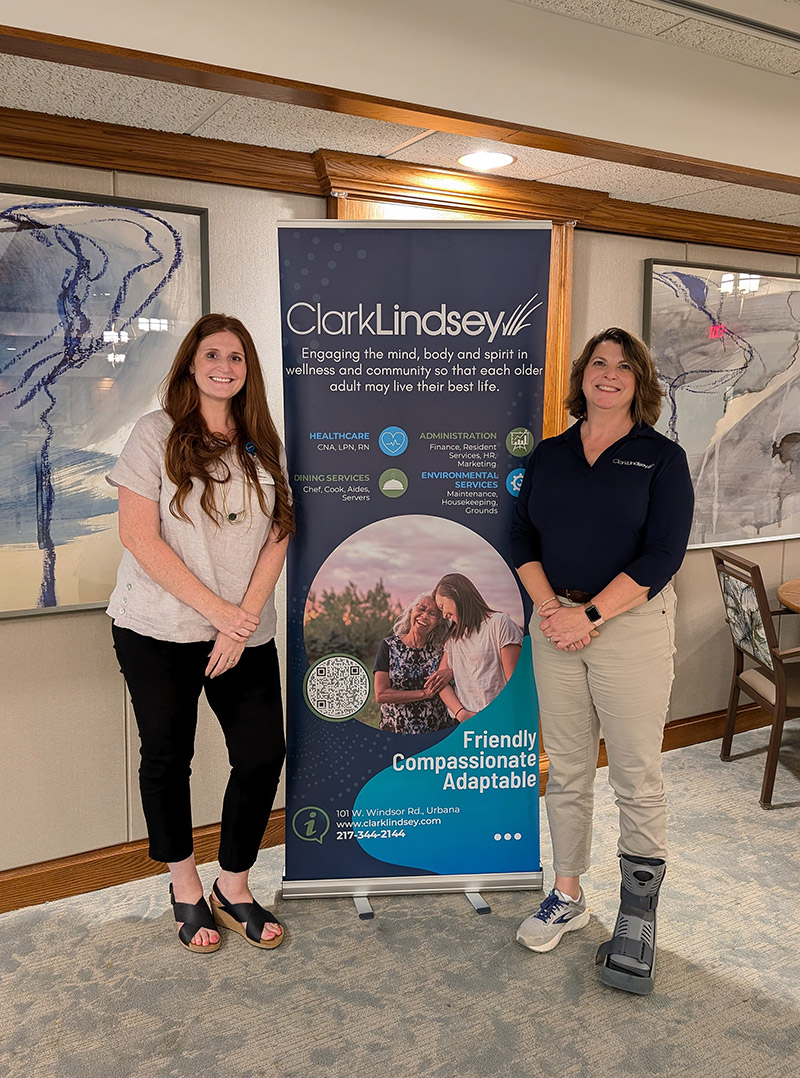ClarkLindsey in Urbana stands as East Central Illinois’ first and only nonprofit Life Plan Community, a tribute to the legacy of Ethel Lindsey Clark and Maud Lindsey. These two visionary women generously left bequests with the directive “to establish, construct, and maintain a home for elderly persons.” Today, ClarkLindsey’s 28-acre campus serves 316 residents and employs 290 community members.
ClarkLindsey’s reputation of providing an excellent environment for older adults to live their best life extends beyond East-Central Illinois into the state and even nationally. When ClarkLindsey won the LeadingAge Illinois Workplace Excellence award, it was largely due to the extensive work that has gone into creating an environment where residents and employees alike can experience meaningful life by engaging in opportunities for personal growth that are offered throughout the campus.
ClarkLindsey also has a Resident-led DEI Committee that plays a pivotal role in fostering an inclusive and supportive environment for everyone. By championing diversity, equity, and inclusion initiatives, the committee ensures that all voices are heard and respected. This inclusive culture not only strengthens the sense of belonging and community among residents but also enhances the collaborative work environment for employees. The managers at ClarkLindsey are always willing to provide training, coaching and support to team members, no matter their background, training, or even what language the team member speaks, to ensure that they have all of the tools needed in order to be successful. Leadership understand that investing in a person through relationships and training results in hard work, loyally and dedication, and ultimately an excellent environment for the residents who live at ClarkLindsey.
As a LEAP (Leaders Employing All People)-certified employer, ClarkLindsey is deeply committed to meeting the needs of both its residents and employees. According to Krista Borbely, the Talent Acquisition and Development Manager, “The ClarkLindsey Model is based on relationships.” This focus on relationships is a cornerstone of their success, reflected in their strong partnerships, community service projects, and the care they provide to their residents. ClarkLindsey’s partnership with the Refugee Center originated from a hiring need coinciding with the arrival of new, diverse populations in the area. A driver at ClarkLindsey facilitated the initial connection with the Refugee Center, leading to the creation of a new talent pipeline. ClarkLindsey is proud of the fact that employees at all levels of the organization are scanning the local community to discover opportunities to build partnerships which will ultimately enhance the services offered to residents.
To date ClarkLindsey has successfully collaborated with their local Title 1 program to create WIOA funding On the Job Training plans in both Human and Environmental Services. Both positions ensured to focus on DEI.
Each year, ClarkLindsey hosts up to 30 interns and facilitates clinical experiences for dozens CNA and RN students through its educational partnerships. Additionally, the organization is invested in researching new technologies that enable older adults to live independently.
One of ClarkLindsey’s most recent partnerships is with the Family Service Center of Champaign County. Through this collaboration, ClarkLindsey has committed to supporting the Meals on Wheels program, providing 60 meals a week to adults aged 60 and older.
ClarkLindsey has demonstrated exceptional business leadership through strategic partnerships in workforce and economic development. By collaborating with the Developmental Services Center (DSC), Urbana Adult Education (UAE), Eastern Illinois Food Bank, The Refugee Center, RPC Workforce Development, Parkland College, and the Research Park at the University of Illinois, Clark Lindsey has not only strengthened its workforce but has also contributed to the broader economic health of the region. These partnerships have allowed ClarkLindsey to tap into diverse talent pools, offer educational and professional development opportunities, and provide essential services to the community, solidifying its role as a leader in fostering economic growth and improving the quality of life for its employees and the community at large.

